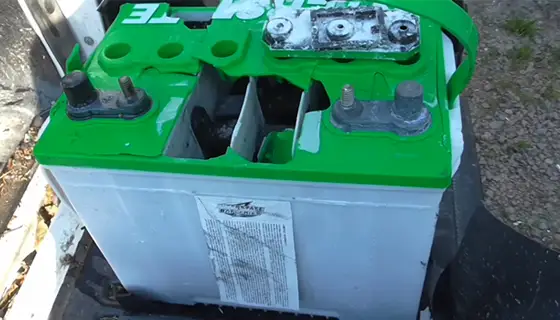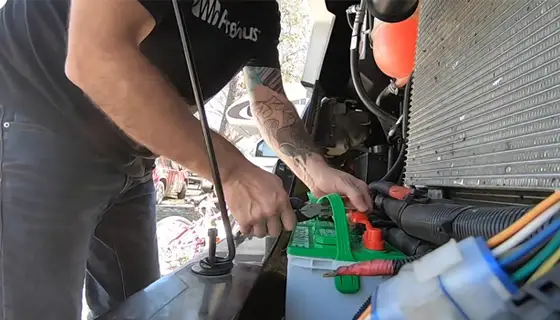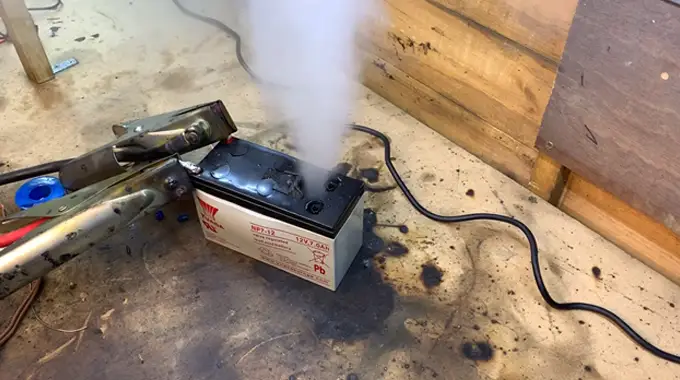Last Updated on May 4, 2023
Just like any other battery, an RV battery can explode if it’s damaged or overheated. The danger with an RV battery is that it’s usually located in a confined space, such as a storage compartment. This can increase the risk of serious injury if the battery explodes.
RV batteries typically contain sulfuric acid, which can be highly corrosive. If the acid comes into contact with the skin, it can cause severe burns. For these reasons, it’s important to take precautions to prevent an RV battery from exploding.
It is not only important but also an emergency, why do RV batteries explode? In this article, we’ll explore the most common causes of battery explosions and how you can avoid them.
Why Do RV Batteries Explode : A Basic Explanation:
In short, it’s a matter of chemistry. Batteries are full of volatile chemicals that are capable of generating a lot of heat. When those chemicals get too hot, they can cause the battery to rupture.
This can happen if the battery is overcharged, if it’s damaged, or if it’s exposed to extreme temperatures. Whatever the cause, an exploding battery is never a good thing. That’s why it’s important to be careful when handling them.
Why RV Batteries Prone to Explode Over Time : Depth Analysis

As now we have a generalized idea, let’s take a closer look at what causes RV batteries to explode. There are many factors that can result in this unfortunate incident. But, most of the time, it happens because of the following reasons:
1. Overcharging
2. Improper Battery Cables and Connections
3. Old and Damaged Batteries
4. Low water level
5. Short Circuiting
6. incorrect Storage Conditions
Now let’s discuss each of these reasons in detail:
1. Overcharging:
One of the main reasons for RV batteries to explode is overcharging. In simple terms, it means charging the battery beyond its capacity. The battery contains lead plates which are covered in a solution of sulfuric acid.
When it is excessively charged, the lead plates begin to break down and release hydrogen gas. This gas is highly explosive and can easily catch fire, causing the battery to explode. As a result, it is important to carefully monitor the charging process and avoid overcharging the battery.
2. Improper Battery Cables and Connections:
An explosion of an RV battery can easily be caused by improper cables and/or connections. It can happen twofold; unsuitable cable or loose connections. Sometimes faulty connections can be stemmed from unsuitable cables.
When the cables are not the right size or are not properly attached, they can cause a spark. Sparks can ignite flammable gasses in the battery, resulting in an explosion. In addition, loose or damaged cables can also cause a short circuit. This can draw too much power from the battery, causing it to overheat and explode.
3. Old and Damaged Batteries:
Battery explosions can occur when the battery is damaged or if it is old and corroded. When a battery is ruptured, the electrolyte that helps to keep the chemical reaction in balance can leak out. If this electrolyte comes into contact with metal, it can create a spark that can ignite the flammable gas inside the battery.
Furthermore, if internal pressure becomes too high, the battery can rupture and explode. Batteries that have seen better days will be more prone to this.
4. Low Water Level:
An RV battery is essentially a large lead-acid battery, and like all lead-acid batteries, it needs to be kept at a certain water level in order to function properly. When the water level inside the battery gets too low, the lead plates inside will start to touch.
This will cause a chemical reaction that will generate heat, and as more and more heat builds up, the pressure inside the battery will increase until eventually, the battery will rupture.
5. Short Circuiting:
RV batteries are susceptible to a condition called “short-circuiting.” This occurs when the current from the battery is diverted into a nearby conductive object, usually another battery. As a result, the battery can overheat and explode.
Short-circuiting often results from electrical problems within the RV, such as faulty wiring or loose connections. It can also be caused by physical damage to the battery, such as a puncture or crack.
6. Incorrect Storage Conditions:
RV batteries often explode due to incorrect storage conditions. When batteries are stored in a hot environment, the heat causes the battery acid to evaporate. Eventually, the battery can explode due to the increased concentration of acid.
If batteries are not properly vented, gasses can build up inside the battery, leading to an explosion. Batteries can also catch fire if they are not stored in a cool, dry place.
What to Do if Your RV Battery Explodes?

When a battery explodes, it releases a cloud of highly combustible hydrogen gas. This gas can quickly ignite, causing a fire that spreads rapidly through the RV. In addition, the exploding battery itself can be hurled with great force, causing serious damage to anything in its path.
While it’s unlikely that your RV battery will explode, it’s still important to know what to do if it happens. The first step is to disconnect the battery from the RV. If possible, move it away from the vehicle as well. Once the battery is disconnected, call a professional to dispose of it safely.
In the meantime, make sure to ventilate the area and avoid using any electronic devices near the battery. Always keep water and a first aid kit in hand as a precaution. By taking these precautions, you will be able to prevent serious injuries in the event of an RV battery explosion.
How to Prevent Your RV Battery from Exploding?

1. Change Old and Damaged Battery: As batteries age, their performance declines, and they become more susceptible to damage. Therefore, it’s important to regularly check your batteries for signs of wear and tear and to replace them when necessary.
If you suspect that a battery is damaged or faulty, it’s best to err on the side of caution and avoid using it.
2. Using a Smart Charger to Regulate Voltage: It’s important to use a smart charger when charging an RV battery. Such a charger will regulate the voltage to prevent the formation of hydrogen gas.
It will shut off automatically when the battery is fully charged, preventing overcharging and further reducing the risk of an explosion. Your RV battery can be safe and accident-free when you use a smart charger.
3. Proper Ventilation: When it comes to RV batteries, it is crucial to remember that proper ventilation is essential in order to prevent explosions. Batteries produce hydrogen gas when they are charging, which is highly flammable. If the gas builds up inside the RV battery compartment, it can lead to a dangerous situation.
Because of this, it is so important to ventilate the battery compartment well. One way to ensure proper ventilation is to install a vent fan in the compartment. The air will be circulated and hydrogen gas will not build up.
In order to maintain ventilation, an obligatory task is to keep the battery compartment clean and free of debris. Dirty battery compartments can restrict airflow and cause explosions.
4. Follow the Right Connection and Charging Procedure: RV battery explosions are often caused by incorrect charging. When charging an RV battery, it is essential to make sure that the positive and negative terminals are properly connected. The positive cable should always be connected first, as this will help to minimize the risk of sparks.
Once the positive cable is in place, the negative cable can be connected to the battery post. Finally, the negative cable should be connected to good ground, such as the chassis of the vehicle. Check with the battery of your manual before following these procedures.
5. Maintain Proper Cleanliness of Terminals: An unclean battery connection can cause sparking when high amps are drawn, such as when an engine is started. This can not only damage the battery but also poses a fire hazard. Cleaning the terminals of a battery can be accomplished by mixing baking soda with water.
Use an old toothbrush or similar brush to apply the paste to the terminals, and then rinse with clean water. Another way to clean battery terminals is to use a commercial cleaning product specifically designed for this purpose. Whichever method you choose, be sure to disconnect the negative cable from the battery before starting.
FAQs:
1. What Does it Mean When a Battery Makes a Popping Noise?
Ans: In most cases, it’s nothing to worry about. Batteries produce electricity through a chemical reaction between the electrodes and the electrolyte. As the electrodes react with the electrolyte, they produce heat. This heat can sometimes cause the battery to make a popping noise.
When a battery leak or is damaged, the popping noise may turn into sparks or flames. In these cases, it’s important to take caution and contact a professional for help.
2. Do AGM Batteries Explode?
Ans: Yes. If the conditions present themselves, an AGM battery can easily explode like any other type of battery. Fortunately, these types of explosions are rare, and they can usually be prevented by following manufacturer guidelines for charging and maintenance.
3. Will a Swollen Battery Explode?
Ans: When a battery swells, gasses are accumulating inside it. This is often caused by overcharging the battery or by leaving it plugged in for too long. If the battery continues to swell, it could eventually catch on fire or explode.
While this may sound alarming, it is actually quite rare for batteries to explode. Most swollen batteries will simply stop working and need to be replaced.
4. Can Batteries Explode When Not in Use?
Ans: Batteries rely on a chemical reaction to generate electricity. A chemical reaction can only occur when an electric circuit is connected to the battery. When a battery is not being used, there is no electrical current flowing through the battery, and therefore no chemical reaction taking place.
As a result, batteries cannot explode when they are not in use. But, Overheating batteries or batteries caught in a fire can explode when left too close to a heat source.
Conclusion:
One of the most dangerous RV battery explosions is also the easiest to prevent. The best way to prevent this from happening is to use a quality charger that automatically shuts off after a full charge.
You should also check the charging system regularly to make sure it’s working properly. By taking these simple precautions, you can help keep your RV safe from the dangers of exploding batteries.



